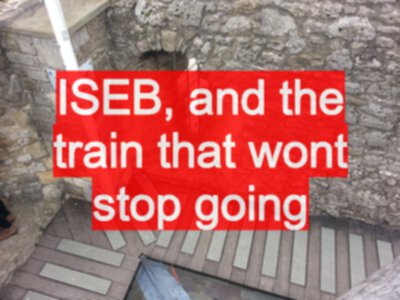What an easy target ISEB makes, it comes in for a lot of criticism. And I think it should. To an outsider like myself the certification train looks like a money spinning exercise, why else keep cranking out certification levels? I wonder what they could do to change my perception…
Note: I wrote this post in 2008, since then ISEB have become ISTQB and added a host more certifications. They wont’ stop.
ISEB currently promotes 4 testing certification levels - the Foundation, Intermediate, Practitioner Test Manager and Practitioner Test Analyst.
I find it too easy to believe that ISEB has money making intentions rather than the ‘profession’s best intentions to hand. Given that the names of the writers of the syllabus all supply training towards ISEB Certification. I find it too easy to perceive a conflict of interest.
I don’t want to believe that ‘It’s all about the money’ because the BCS has registered as a charitable organisation that states “Its objects are to promote the study and practice of computing and to advance knowledge of and education in IT for the benefit of the public.” For the benefit of the public, not for its own monetary gain.
So I’m going to step back a little and say some good things:
- Syllabuses freely available on the web, this counts towards the public good. I won’t critique the content here.
- The foundation syllabus has matured and represents a very basic, committee produced, introduction to ‘software testing’.
Encourage any students using the syllabus for self learning to look for other sources of information on the web.
e.g. BBST syllabus
Bad points:
- You have to chain through the exams i.e. you can’t just start in the middle you have to do the basic courses first.
- The other syllabus do not match the maturity of the foundation and don’t really add much to augment the foundation documentation.
- Courses are taught generically, i.e. you don’t pick them because the instructor is an expert and the best trainer, you pick them because you want the certificate and want to study locally.
Why do you have to chain through the exams? Why can’t you just jump ahead to the practitioner if you want to? Even if you have worked as a tester for 25 years, you still have to sit and pass the foundation, and the intermediate. Why? To protect the candidate from their own risky predisposition? Let them take the risk if they choose to.
A tester, a person who deals with risk on a daily basis.
A cynic might think that the chaining related to making money or selling further training.
Suggested Fixes:
- Have Industry provide a syllabus which contains the things that ‘it’ wants the testers to know.
- Have ISEB ratify the syllabus and organise the creation and sitting of the exams, and the marking facilities.
- Remove the conflict of interest with the trainers.
- Do not let the trainers write the questions.
- Do not let the trainers define the syllabus.
- Do not let the trainers mark the exams.
- Do not let the trainers sit on the ‘board’.
- Do not do anything that looks like a conflict of interest and makes this look like a money spinning exercise.
- Allow anyone who wants to, at any point in the chain take the exam. Have no dependency on a previous exam. Just charge them a fair price to cover the cost of sitting and marking the exam.
- Make trainer costs and pass rate/fail rates visible on the main web site to allow candidates to choose
- Make pass/fail rates for self study candidates visible on the main web site
- Provide a simple, visible, online mechanism for taking comments publicly on the syllabus and publishing a summary of disagreements. (this would help prevent duplicate comments coming in)
- Make any multiple choice test completely automated and as nominally priced as possible (try and make it free).
Note on the above:
On making multiple choice exams nominally priced (or free). Any fee should cover the costs of writing questions, hosting the site and database, and all related admin. Think of it like a charitable act to the testing ‘profession’. This would provide a public service to the testing community. I suspect that the foundation exam has probably paid for itself by now - if so make it completely free.
Trainers can still train.
“Old Charlie stole the handle and The train, it won’t stop going No way to slow down. "







